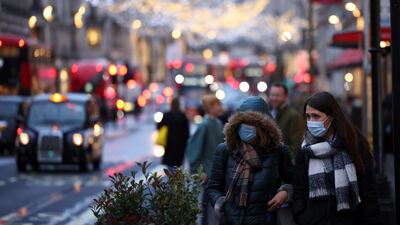People who have been vaccinated against coronavirus should still wear a mask, says the World Health Organisation.
Scientists said on Monday there was still uncertainty over whether the vaccine prevented the spread of coronavirus.
WHO immunisation director Kate O'Brien said people who were vaccinated could still become infected, even if the inoculation protected them from severe illness, and advised them to continue to maintain a social distance and wear a face mask.
British scientists are still investigating how a new strain of coronavirus discovered in the south-east of England might affect immunisation.
The original strain, detected in China’s Wuhan city in December 2019, is known as the L strain. The virus mutated into the S strain at the beginning of 2020, followed by V and G strains. Strain G mutated further into strains GR, GH and GV.
Several other infrequent mutations were grouped together as strain O.
Prof Adam Finn, of the University of Bristol, said vaccines could be modified if required.
“We’re not talking about a strain that is killing people more, it’s just spreading about more,” he said. “Ultimately the vaccines can be modified to chase the changes in the virus.”
More than 1,000 people are thought to have been infected by the new mutation of Covid-19.
Prof Nick Loman, a University of Birmingham expert, said that while mutations were not unusual, the new strain was concerning.
“There’s a very strong association [of the strain] with parts of England where we're seeing a high rate of growth,” he told the BBC. “This is certainly something we find concerning and is worth acting on.”
Meanwhile, Germany's Health Minister Jens Spahn has been assured that the EU medical regulator will approve the Pfizer-BioNTech vaccine by December 23.
Germany had been pressuring the European Medicines Agency to act with pace, with the drug already approved in the UK, US and Canada.
"Our goal is an approval before Christmas," Mr Spahn said. "We want to start vaccinating this year."
Germany has about 440 vaccination centres and 10,000 doctors and medical staff on standby for when the inoculation is approved.
Seeing the vaccine being given to thousands of people elsewhere is galling for many Germans.
“It cannot be that a vaccine that has been developed in Germany is only approved and vaccinated [here] in January,” MP Christine Aschenberg-Dugnus said.
EMA chief Emer Cooke said on Monday that her team was working "around the clock" but added that the approval timeline was constantly under review.
Part of the problem could be that the EU is seeking to begin vaccination in all of its nations at the same time, and Germany could be more prepared than others.


